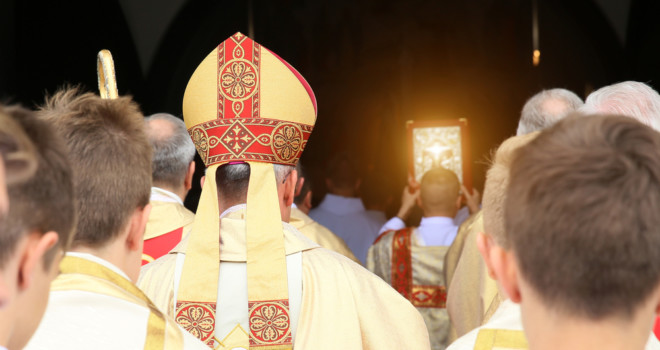As we continue the June meeting of the USCCB (where they will discuss and implement norms on how to best address the latest round of the abuse crisis in the Church), there are a lot of different emotions Catholics are feeling.
There will also be a lot of different suggestions for ways the laity can help contribute to the discussion. The chief among these may be the hardest thing for Christians to do, and that is prayer.
Prayer Can Be Hard
While the Christian should always be a man of prayer, Christ understands prayer can be difficult. Especially when you have to pray for someone corrupt or who you just don’t like. Several times He warns us in the Scriptures that if we only pray for those we like and agree with, we are no better than the pagans.
The true mark of a Christian is praying for somebody you don’t like. Indeed, the true mark of a Christian is praying for somebody who doesn’t deserve your time.
I know there are some who will think this offends pious sensibilities, but it must be said: there is a feeling, potentially widespread, that our leaders have gotten things so wrong they are not worthy of prayer. We can act like this sentiment doesn’t exist, but we’re fooling ourselves. We are blinding ourselves to reality for the sake of our comforts. Sometimes we might even be putting up that display because deep down we suspect that claim might be right. If we think that, we are wrong. It is not an option to not pray.
So if we must pray, how do we pray for those who annoy us, or for those who have done wrong?
What Prayer is Not
At this point, we must address a certain objection. When one points to this reality above, it is often said we must first accuse ourselves before we recognize the guilt of others. This is a misreading of the words of our Lord. Our Lord was indeed worried about hypocrisy, but he did not demand perfection in realizing the errors of others. Rather, he pointed out that the standard by which we judge, we shall be judged by. As Christians, we are required to discern. Whether we have lived our life perfectly or not, we can and must still recognize the faults of others.
We might be able to explain or mitigate their culpability, but there has been a wrong, and we must realize it. If we do not realize this, our prayer life is not honest. Too often we hear the cliché of “thoughts and prayers” mocked, and I suspect it is for this reason. Praying becomes a cliché for the believer. We say we will pray because it’s the nice thing to do, but we don’t want to dig too deeply when we pray, because we don’t want to make someone uncomfortable. Most importantly, we don’t want to make ourselves uncomfortable.
Recognizing our leaders are capable of wrong, but still making a conscious decision to accept them as successors of the Apostles isn’t easy, but we are required to do it. Any call to prayer that is focused on painting an alternative reality must be dismissed with the utmost of prejudice.
Why Pray for Others?
The first thing we should always pray for, when it comes to others, is their salvation. While it might sound weird praying every night that the Pope and Bishops make it to heaven, that’s something we have to stop thinking of as weird.
All men, lay and clerics, pew sitter to pope, are in need of salvation. All men, until their dying breath, can reject God. All men, of whatever their rank, will be forced to give an account to God for all that they have done. Even a man as wise and holy as St. Ambrose recognized he could not withstand Christ’s judgement, hence his appeal to the fountain of mercy. So, when you pray for that individual, pray that they be spared the fear of facing their judge. Pray that they may be pushed by the Spirit, at every
possible moment, towards the fountain of mercy.
Furthermore, when you pray, be real about why you pray. Don’t just pray as a pious sentiment. Is someone arrogant? Then pray that they be delivered from arrogance. Reflect on times in the past when you were arrogant, and the trouble it often got you in. Pray that they be spared from that trouble. Every human being, even the greatest of saint, has sinful tendencies and impulses that, left to them, they will find ruin. If you have a good idea what those impulses are, pray that person is delivered from them.
If you aren’t sure if that individual has those problems, ask God still that they be protected from those vices in the future. This is when accusing yourself can have some value. The reason we accuse ourselves is not to avoid praying for others. We accuse ourselves because we know the pain those sins can cause, because we have experienced them on a personal level, and we wish the target of our prayers would be spared that misery.
Pray For the Church
First of all, then, I urge that supplications, prayers, intercessions, and thanksgivings be made for all men, for kings and all who are in high positions, that we may lead a quiet and peaceable life, godly and respectful in every way.
This is what St. Paul writes to his disciple Timothy in the final stage of his life. When we pray for those in authority, we not only pray for them, but that the Church may have a “quiet and peaceable life” in relation to them. If leaders do wrong, then we pray that they may save the Church further embarrassment and shame.
The Church cannot live a quiet and peaceable life under the specter of the present crisis. When we pray, we pray that God may open the eyes of those in authority and cause them to see how their actions are harming the Church. Few men are so wicked and impious as to will the Church harm. When confronted with that harm on a personal level, we pray they see this, repent, and amend their life.
Pray that God Acts When They Do Not
When one reads the prayers of the Old Testament, one finds that their prayer life ran the gamut of emotions. They prayed that the God would “scatter the proud in their conceit” as the canticle of Zechariah tells us. The Psalmist prays that those who do evil against the Lord be confounded so they can be defeated. While one hates to see the Church brought to low esteem on their account, sometimes we have to accept that the proud must be scattered.
We have the promise of Christ that the gates of hell will not prevail, and that, no matter what, the Church will remain. Her Magisterium will remain intact. Her sacraments will remain. The Spirit does not guarantee that each individual cleric and leader will come along for the ride. The Spirit does not guarantee a pope or bishop will not be brought low and humbled for their mistakes. This is something one cannot wish on another, but if they do not do what is right, eventually God will humble them, as a way to help make them realize that they must turn to him.
We should pray without ceasing that such a day does not come. Yet when it does (and it may indeed be here), we pray that the individual listens, and that the Church be protected as much as possible during that process of humbling. Sometimes that damage is inevitable, yet we trust God will limit it to the greatest extent. Finally, we pray that if the leader in question cannot or will not provide for the common good, then we pray that God will bring someone to the Church who will.
Never Cease Praying
If any of these admonitions regarding prayer make someone feel uncomfortable, that’s the point. Prayer is not supposed to be comfortable. It is a deeply personal affair that requires being as realistic as one can be, because the stakes could not be higher: immortal souls are on the line, and the ability of the Church to spread the Gospel hinges on the ability of the Church to pray. While that can make us tremble, we should also look at it as a blessing: God has chosen to include us in such an important matter.
High as the stakes are, God has chosen you, in this moment in time, to pray, and perhaps that prayer will change the course of human events. So when you see the next news story that angers you, and you wonder if all this prayer stuff matters, reflect on what prayer truly is, and see that it does.













